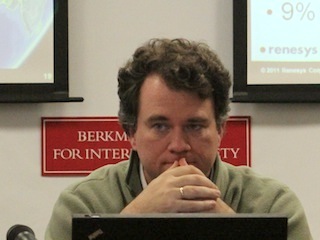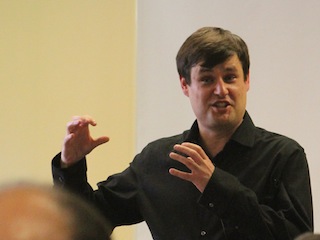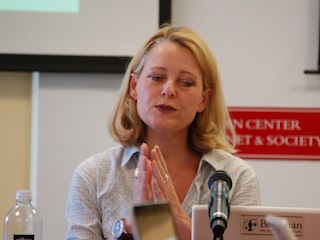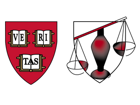Posts filed under 'Berkman Luncheon Series'
Thanks to the internet, we now live — more and more — in public. Yet change brings fear, and many people—nostalgic for a more homogeneous mass culture and provoked by well-meaning advocates for privacy—despair that the internet and how we share there is making us dumber, crasser, distracted, and vulnerable to threats of all kinds.
In this talk, Jeff Jarvis — blogger, professor of journalism, and author of the recent book “Public Parts” — argues persuasively and personally that the internet and our new sense of publicness are, in fact, doing the opposite. Jarvis travels back in time to show the amazing parallels of fear and resistance that met the advent of other innovations such as the camera and the printing press. The internet, he argues, will change business, society, and life as profoundly as Gutenberg’s invention, shifting power from old institutions to us all.

Also in ogg for download
More info on this event here
December 6th, 2011
Thanks to the internet, we now live — more and more — in public. Yet change brings fear, and many people—nostalgic for a more homogeneous mass culture and provoked by well-meaning advocates for privacy—despair that the internet and how we share there is making us dumber, crasser, distracted, and vulnerable to threats of all kinds.
In this talk, Jeff Jarvis — blogger, professor of journalism, and author of the recent book “Public Parts” — argues persuasively and personally that the internet and our new sense of publicness are, in fact, doing the opposite. Jarvis travels back in time to show the amazing parallels of fear and resistance that met the advent of other innovations such as the camera and the printing press. The internet, he argues, will change business, society, and life as profoundly as Gutenberg’s invention, shifting power from old institutions to us all.
 Download the MP3
Download the MP3
…or download the OGG audio format!
More info on this event here
December 6th, 2011
The growth of the global Internet is still determined, in large part, by local factors like geography, politics, and the economics of interconnection and competition. A lot is at stake, especially as the countries that emerge as Middle Eastern regional transit hubs play a significant role in the evolution of the region’s post-oil information economy. In this talk James Cowie — Chief Technology Officer at Renesys Corporation — examines the paths along which Internet traffic flows, focusing on the emerging markets of the Middle East and Central Asia, discusses ways in which the evolution of these paths dictates the choices available to information consumers, and the costs they must pay to interconnect with global information markets.

Click Above for Video
…or download the OGG video format!
More info on this event here
November 1st, 2011
The growth of the global Internet is still determined, in large part, by local factors like geography, politics, and the economics of interconnection and competition. A lot is at stake, especially as the countries that emerge as Middle Eastern regional transit hubs play a significant role in the evolution of the region’s post-oil information economy. In this talk James Cowie — Chief Technology Officer at Renesys Corporation — examines the paths along which Internet traffic flows, focusing on the emerging markets of the Middle East and Central Asia, discusses ways in which the evolution of these paths dictates the choices available to information consumers, and the costs they must pay to interconnect with global information markets.
 Download the MP3
Download the MP3
…or download the OGG audio format!
More info on this event here
November 1st, 2011
Consider the Polymath Project, an ongoing experiment in “massively collaborative” mathematical problem solving. The idea is to use online tools like blogs and wikis to collaboratively attack difficult mathematical problems. Michael Nielsen — author of the book Reinventing Discovery and an advocate of open science — discusses how online tools like the Polymath Project can be used to transform the way we humans work together to make scientific discoveries, and how the normally conservative scientific culture can become more open.

Click Above for Video
…or download the OGG video format!
More info on this event here
October 25th, 2011
Museums and academic institutions are rapidly digitizing their ethnographic collections to make them accessible to the public and to communities from which they originated. These practices amplify the public nature of institutional collections, create opportunities for re-thinking how collections should be shared online, and help merge global heritage policies and institutional practices with Aboriginal paradigms of knowledge circulation, ethics, and control.
In this talk about collaboratively designed virtual museum projects with Dane-zaa and Inuvialuit communities in Canada, Kate Hennessy — Director of the Making Culture Lab at Simon Fraser University’s School of Interactive Arts and Technology — shows how access to digital collections can both facilitate the reclaiming of intellectual property rights and copyright of cultural heritage––including the right to restrict circulation of cultural property––and support the design of archives and virtual exhibits on Aboriginal terms.

Click Above for Video
…or download the OGG video format!
More about this event here
June 14th, 2011
Museums and academic institutions are rapidly digitizing their ethnographic collections to make them accessible to the public and to communities from which they originated. These practices amplify the public nature of institutional collections, create opportunities for re-thinking how collections should be shared online, and help merge global heritage policies and institutional practices with Aboriginal paradigms of knowledge circulation, ethics, and control.
In this talk about collaboratively designed virtual museum projects with Dane-zaa and Inuvialuit communities in Canada, Kate Hennessy — Director of the Making Culture Lab at Simon Fraser University’s School of Interactive Arts and Technology — shows how access to digital collections can both facilitate the reclaiming of intellectual property rights and copyright of cultural heritage––including the right to restrict circulation of cultural property––and support the design of archives and virtual exhibits on Aboriginal terms.
 Download the MP3
Download the MP3
…or download the OGG audio format!
More about this event here
June 14th, 2011
New research co-authored by Nicole Ellison — Associate Professor in the Department of Telecommunication, Information Studies, and Media at Michigan State University — attempts to identify specific Facebook-enabled behaviors that contribute to users’ ability to access diverse perspective, novel information, and social support.
In this talk Professor Ellison provides an overview of this research and explores the link between bridging social capital levels and Facebook-related factors such as time on site, the number of Facebook Friends, and a set of behaviors called “Cultivation of Social Resources.”
 Download the MP3
Download the MP3
…or download the OGG audio format!
More about this event here
June 7th, 2011
User trust has been identified as a key success factor of online business: A user’s willingness to provide personal data is a prerequisite for online transactions. But the qualities that communicate trustworthiness to a user are varied and difficult to parse.
Miriam Meckel — Professor for Corporate Communication at the University of St. Gallen, Switzerland, and the Managing Director of the Institute for Media and Communication Management — discusses the results of a recent study of users of online services, and identifies the nine core drivers of online trust.

Click Above for Video
…or download the OGG video format!
May 31st, 2011
There is a full-scale “communication crisis” going on. Otherwise meaningful conversations and valuable data points are spread incoherently across various platforms. As communication channels increase in number and function, how will formerly society-wide notions of culture and protocol evolve to a personal and group level?
Greg Elliott — a master’s student at the MIT Media Lab — and Hugo Van Vuuren — a Berkman fellow — present Protocol, a tool to help users communicate their personal communication preferences over multiple communication platforms (in beta at www.protocol.by).

Click Above for Video
…or download the OGG video format!
April 21st, 2011
Previous Posts







